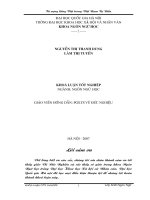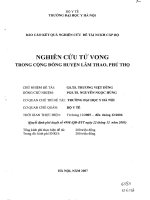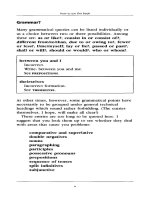Nghiên cứu từ vựng trong tiếng anh3 pps
Bạn đang xem bản rút gọn của tài liệu. Xem và tải ngay bản đầy đủ của tài liệu tại đây (59.56 KB, 11 trang )
prone/supine
PRONE/SUPINE
“Prone” (face down) is often confused with “supine” (face up). “Prostrate” technically also means
“face down,” but is most often used to mean simply “devastated.”
See also “prostate/prostrate.”
List of errors
file:///C|/Temp/livres/commonerrors/errors/prone.html03/09/2005 15:39:30
pronounciation
PRONOUNCIATION
PRONUNCIATION
“Pronounce” is the verb, but the O is omitted for the noun: “pronunciation.” This mistake ranks right up there in incongruity with “writting."
List of errors
file:///C|/Temp/livres/commonerrors/errors/pronounciation.html03/09/2005 15:39:30
prophecy/prophesy
PROPHECY/PROPHESY
“Prophecy,” the noun, (pronounced “PROF-a-see") is a prediction. The verb “to
prophesy” (pronounced “PROF-a-sigh") means to predict something. When a prophet prophesies he
or she utters prophecies.
List of errors
file:///C|/Temp/livres/commonerrors/errors/prophecy.html03/09/2005 15:39:30
prostate/prostrate
PROSTATE/PROSTRATE
The gland men have is called the prostate. “Prostrate” is an adjective meaning “lying face
downward."
List of errors
file:///C|/Temp/livres/commonerrors/errors/prostate.html03/09/2005 15:39:30
protray
PROTRAY
PORTRAY
There are a lot of words in English that begin in “pro ” This is not one of them. When you make a portrait, you portray someone.
List of errors
file:///C|/Temp/livres/commonerrors/errors/protray.html03/09/2005 15:39:30
proved/proven
PROVED/PROVEN
For most purposes either form is a fine past participle of “prove,” though in a phrase like “a proven
talent” where the word is an adjective preceding a noun, “proven” is standard.
List of errors
file:///C|/Temp/livres/commonerrors/errors/proved.html03/09/2005 15:39:31
purposely/purposefully
PURPOSELY/PURPOSEFULLY
If you do something on purpose (not by accident), you do it purposely. But if you have a specific
purpose in mind, you are acting purposefully.
List of errors
file:///C|/Temp/livres/commonerrors/errors/purposely.html03/09/2005 15:39:31
g/q
G/Q
Lower-case “q” is the mirror image of lower-case “g” in many typefaces, and the two are often
confused with each other and the resulting misspelling missed in proofreading, for instance “quilt”
when “guilt” is intended.
List of errors
file:///C|/Temp/livres/commonerrors/errors/GQ.html03/09/2005 15:39:31
quantum leap
QUANTUM LEAP
The thing about quantum leaps is that they mark an abrupt change from one state to a distinctly
different one, with no in-between transitional states being possible; but they are not large. In fact, in
physics a quantum leap is one of the smallest sorts of changes worth talking about. Leave “quantum
leap” to the subatomic physicists unless you know what you’re talking about.
List of errors
file:///C|/Temp/livres/commonerrors/errors/quantum.html03/09/2005 15:39:31
queue
QUEUE
If you’re standing in a queue you’ll have plenty of time to ponder the unusual spelling of this word.
Remember, it contains two “U” s."
List of errors
file:///C|/Temp/livres/commonerrors/errors/queue.html03/09/2005 15:39:32
quiet/quite
QUIET/QUITE
This is probably caused by a slip of the fingers more often than by a slip of the mental gears, but one
often sees “quite” (very) substituted for “quiet” (shhh!). This is one of those common errors your
spelling checker will not catch, so look out for it.
List of errors
file:///C|/Temp/livres/commonerrors/errors/quiet.html03/09/2005 15:39:32









